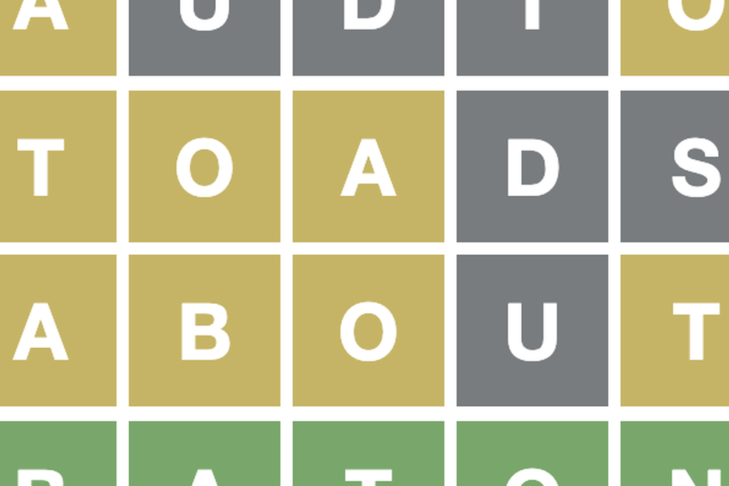It was at the beginning of January when I saw a Facebook post from a friend with a series of black, yellow and green tiles alongside a word I did not know—“Wordle”—and a series of numbers—“200 5/6.” And now, only four weeks after I saw that first post, this little online word game has been sold to The New York Times and Wordle is a household name and something of an internet phenomenon. If you’re on social media, if you follow the news or watch “Saturday Night Live,” then you’ll have seen Wordle in posts, articles and even a skit.
It has been amazing to see the way in which this little game has captured the imagination and become a sensation. Many articles have now been written trying to explain why the game has garnered such a dedicated following. It’s the simplicity of the game—six tries to guess a five-letter word. It’s the communal aspect—everyone is playing the same game each day. It’s the limit—you can only play a single game in a 24-hour period. And many have suggested that it really exploded when the game creator added a button allowing people to share their result via their social media channels.
As I reflect on the success of Wordle, I think there are some lessons we might learn and apply to our work in Jewish communities.
A realistic time commitment
There are plenty of word games out there that require a significantly greater time investment (think crosswords or word searches); part of the beauty of Wordle is the time limit—one word with a maximum of six guesses. Sometimes our expectations for involvement and engagement with Jewish life require a significant dedication of time (and resources). Perhaps we need to start small and then grow. Make it easy and convenient for people to engage with their Jewish life so that it fits neatly into their daily routine and then grow from there. (Wordle has become a part of my morning routine.) Maybe before we expect people to engage with the whole of Shacharit (the morning prayers) on a daily basis, we start with a single prayer, providing them with a daily moment of connection to their Judaism, and then look for opportunities to grow.
Keep it simple
There is a beautiful simplicity to the game—anyone and everyone can play it. You don’t need to have the most extensive vocabulary to play; we’re all just looking for a single five-letter word. How often do people feel intimidated to engage with Jewish life because they fear they don’t know enough or that everyone else knows more than them? We need to keep it simple and remove the barriers so that everyone can participate no matter where they might be on their personal Jewish journey. It doesn’t need to be one size fits all, but there needs to be multiple entry points that are accessible for everyone.
A shared experience
A significant part of the Wordle fun is seeing how friends did, comparing your “scores” with theirs, and the fact that every day we are sharing in the same puzzle. Most engagements with the Jewish community involve some form of shared experience, but over the last two years this has been difficult in the midst of a pandemic. Each week we are reading the same Torah portion; each day we are reciting the same prayers. In this time of isolation and with fewer people walking through the synagogue doors, the question is: How can we make this into a real shared experience? In response to Wordle, people either want to be part of the group that is playing or, in some cases, part of the group that is resisting. In both situations, there is a shared group experience, and this is something we need to lean into for the Jewish community.
Ultimately (adapting from James Carville), “It’s the community, stupid”
British psychologist Lee Chambers suggested: “The fact that we are all trying to solve the same puzzle brings us together, helping us feel like we are tackling a bigger problem together.” Wordle’s success has come at a time when we are thirsting for community and connection—this simple game provided both. I know which of my friends will share their scores and I am always curious to see how many guesses people required (and in our house, my wife and I have a daily debrief of our score and strategy). It is good news for the Jewish community that people are thirsting for these types of connections. We provided community before the pandemic, we are providing it during the pandemic and we will find ways to provide it after the pandemic. Wordle’s success suggests this is something people are desperate for, and we need to make sure we are ready to provide it today and in the future.
This post has been contributed by a third party. The opinions, facts and any media content are presented solely by the author, and JewishBoston assumes no responsibility for them. Want to add your voice to the conversation? Publish your own post here. MORE



